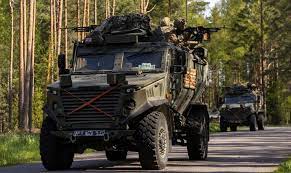UK takes lead of NATO Rapid Response Force

London: UK forces are taking lead of NATO’s rapid response force on 1 January 2024, placing thousands of soldiers on standby and ready to deploy within days.
The United Kingdom’s 7th Light Mechanised Brigade will lead NATO’s rapid reaction force.
NATO’s Very High Readiness Joint Task Force (VJTF) was created after Russia’s illegal annexation of Crimea in 2014 and deployed for the first time for the collective defence of the Alliance after Russia’s full-fledged invasion of Ukraine in 2022.
Taking leadership of the VJTF will see the UK provide the majority of forces in the task force. The United Kingdom’s Allied Rapid Reaction Corps will serve as the land component command.
The leadership position is rotated annually among NATO members, and the UK now takes over from Germany, which led the force in 2023. The UK previously led the task force in 2017.
Defence Secretary Grant Shapps said: “The UK is at the heart of NATO. By heading up NATO’s Very High Readiness Joint Task Force in 2024, we are taking another leading position in the Alliance, sending a clear message that Britain is stepping up to our global defence commitments as NATO enters its 75th year.
The UK’s Armed Forces stand ready, at a moment’s notice, to defend our Allies and protect the British national interest.
The world is a more dangerous and contested place than it has been for decades and we need NATO more than ever. The UK and its allies are committed to supporting NATO and what it stands for.
The VJTF is the highest-readiness element of NATO’s larger Response Force (NRF), which also includes air, maritime and special operations forces. In 2024, VJTF land forces will comprise some 6,000 troops, with the UK’s 7th Light Mechanised Brigade Combat Team – the ‘Desert Rats’ – at its core.
This is the same force that led the response during the activation of NATO’s Strategic Reserve Force in Kosovo last year. The brigade consists of a light cavalry regiment, and four light-mechanised infantry battalions with enabling artillery, engineering, logistics, and medical regiments. Major units include the Royal Scots Dragoon Guards, the 4th battalion The Royal Regiment of Scotland, and the 2nd battalion the Royal Anglian Regiment.
The MOD’s 2023 Integrated Review Refresh was clear that NATO will remain the cornerstone of UK defence and security. The UK remains committed to offering the full spectrum of defence capabilities to the Alliance, and the past year has underlined the continued importance of the Alliance’s role in deterrence and defence.
Our existing commitments to NATO include UK leadership of the enhanced Forward Presence (eFP) mission in Estonia, with a brigade of troops held at high readiness in the UK to reinforce Estonia and the wider Baltic at a time of crisis.
Around 1,000 UK troops are persistently deployed to Estonia as part of the eFP mission – known as Operation Cabrit. This year, over 1,500 UK troops participated in Exercise Spring Storm in Estonia, the first time the UK conducted a brigade-sized deployment as part of Op Cabrit.
The UK also provides a Reconnaissance Squadron to a US-led NATO battlegroup in Poland, as well as a Ground-Based Air Defence system (Sky Sabre) to help protect Polish airspace.
In 2024, nine NATO Allies – UK, Spain, Poland, Hungary, Turkey, Latvia, North Macedonia, Romania and Albania – will contribute to the NATO Response Force. The Alliance will transition the NATO Response Force into the new Allied Reaction Force in mid-2024.





